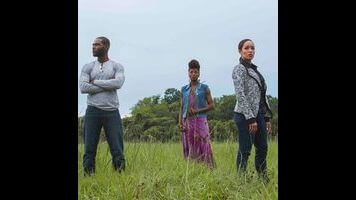In the history of television, there may be no species so rare as the naturalistic, present-day drama featuring black characters. Aside from HBO’s Laurel Avenue, a three-hour miniseries from 1993, and Showtime’s series adaptation of Soul Food, there have been very few tonally neutral small-screen dramas about contemporary black life. When black people are depicted in dramatic television, it’s usually in a David Simon-style exposé of poverty, trauma, and municipal collapse. No wonder a certain presidential candidate is on the campaign trail describing African-American life as a nightmarish hellscape that Hubert Selby Jr. would have found too cynical.
The lack of relatable black dramas is not a failure of the medium, but rather a symptom of a broader lack of contemporary stories about black characters in which race is an element but not a focus. The black experience is often viewed through the lens of the struggle for racial equality, which means the most celebrated stories about black life are backward-looking. Though Ava DuVernay excelled at creating contemporary black dramas for the silver screen with I Will Follow and Middle Of Nowhere, she didn’t win widespread acclaim and a Best Picture Oscar nomination until revisiting the civil rights movement in Selma.
Given the context, Queen Sugar, DuVernay’s first foray into series television, comes floating in on a gust of fresh air. The series, which DuVernay adapted from Natalie Baszile’s novel of the same name, follows the Bordelon siblings of New Orleans as they struggle to adapt to new circumstances following the death of the family patriarch. Rutina Wesley stars as Nova Bordelon, a journalist and local faith healer living in New Orleans not far from her brother Ralph Angel (Kofi Siriboe), an ex-con working to rebuild his life and raise his young son. Both have chilly relationships with their sister Charley (Dawn-Lyen Gardner), who’s living a life far removed from their pastoral upbringing as the wife of a Los Angeles pro basketball legend. When Charley’s husband is mired in a tabloid scandal, the death in the family doubles as an excuse to return home to lie low and avoid the media. With Charley back in Louisiana, the siblings must work together to deal with their father’s legacy: an 800-acre sugar cane farm that still symbolizes the horrors of chattel slavery.
As far as plot is concerned, that’s about the extent of Queen Sugar, which is surprisingly low concept. DuVernay has brought the same observational acuity and compositional strength to Sugar that she brought to her early films, and the main concern about the show early on is that it feels too much like a film project. Even with the juicier plot details added to the screen adaptation—Charley lives a much quieter existence in the book—Sugar feels too short on story to fill one 13-episode season, let alone the second season OWN green-lit before the show’s premiere. Although the log line bears a resemblance to OWN’s other new drama, Greenleaf, the execution couldn’t be more different. Even when Sugar gets into its tawdrier material, DuVernay doesn’t seem all that interested in melodramatic rug-pulls if they come at the expense of thoughtful characterization.
DuVernay makes virtually no effort to repackage what she does for television, and there’s no better evidence than the pilot, which DuVernay directed from her own teleplay and has some peculiar notions about what constitutes an act break. Sugar is the type of show that teaches the audience how it’s supposed to be watched, and it asks the viewer to be patient and savor the light-saturated panoramas and acting prowess while the plot comes together. It’s a reasonable request, but one viewers may be reluctant to grant. Like Rectify before it, Sugar’s quietude and moodiness will alienate anyone looking for a story that can be enjoyed by the scene. It demands to be appreciated as a whole, and actively defies such modern consumption habits as live tweeting.
Despite the discipline it requires, Sugar feels immediately rewarding because of its performances. Wesley is stunning as Nova, playing the character with a steely resolve and a Southern drawl far less hammy than the one she used in True Blood. But Siriboe, with his boyish yet doleful face, is the real casting coup. Ralph Angel doesn’t get quite the attention he deserves in the three episodes screened for critics, with most of the focus going to the sororal tensions between Nova and Charley. But he’s the character that seems most worth spending time with, and the prospect of watching Ralph Angel pull his life back together makes a second season of the show feel less amorphous and more worthwhile.
But that’s the thing about Queen Sugar: it’s sui generis in a way that makes evaluating it by general television standards a fool’s errand. DuVernay is doing her own thing, from the novel premise to the unprecedented move to draft an all-female team of directors to helm the first season’s episodes. Even more impressively, she’s figured out how to turn a quiet, emotional story about a black family in flux into one of the year’s most beautiful and challenging series, one that suggests black America’s best days may still be ahead of it.









































